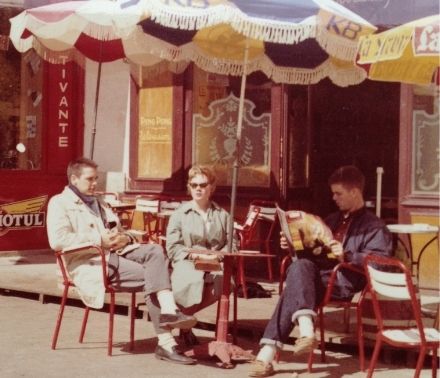75 Years of Fulbright: How the Program Has Impacted the SIS Community
On August 1, 1946, President Harry Truman signed legislation into law that created the Fulbright program, an initiative that would provide grants allowing US citizens to have cultural exchanges around the world. Fulbright grant recipients conduct research projects, teach the English language, and work in different countries for one academic year. The aim of the program is for grantees to engage with the community they live with during that year, serving as cultural ambassadors for the US and promoting mutual understanding with the host country.
Over the years, this famous form of citizen diplomacy has served as a unique way for Americans to see through the lenses of different cultures and understand various perspectives. To commemorate the 75th anniversary of the Fulbright program as well as its importance to the SIS community, we spoke with several faculty and alumni about their Fulbright experiences.
If you’re considering applying for a Fulbright, be sure to check out our Big World podcast episode on how to get a fellowship in international affairs.
Christopher Abanavas, SIS/BA ’17
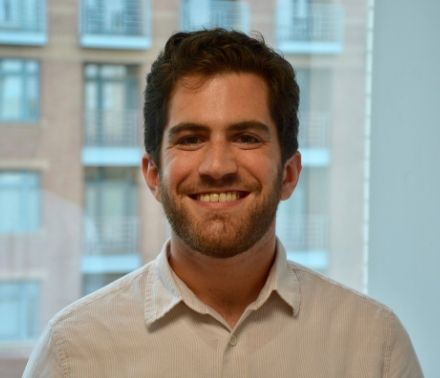
Christopher Abanavas completed a Fulbright English teaching assistantship in Madrid, Spain, after graduating with his undergraduate degree from SIS. Abanavas studied Spanish for two years at AU and then studied abroad in Spain, falling in love with the country. After returning to AU, he received an email from the Office of Merit Awards about the Fulbright program and decided to apply.
“I always thought Fulbrights only consisted of research, and I wasn’t interested in doing academic research,” says Abanavas. “I never thought of applying for a Fulbright until the Office of Merit Awards emailed me, and I learned that teaching assistantships were an option.”
Abanavas was placed in a public secondary school in Madrid, where his main responsibility was to establish and teach Global Classrooms, a Model UN program for non-native English speakers. He taught students basic concepts of international relations, research, debate, and writing skills in preparation for a Model UN conference held in the Madrid region.
He now works as the public diplomacy officer at the Embassy of Spain in Washington, DC, where he promotes Spanish society and culture to an American audience. His time living and working in Spain helped prepare him for his role.
“Living in another country, and especially speaking another language, gives you a better overall perspective. It makes you more flexible and adaptable and helps you in your career and all aspects of life,” says Abanavas. “It was definitely a very helpful and enriching time for me and something that will have an impact on me for the rest of my life.”
Gordon Adams, Faculty
After earning his undergraduate degree, Professor Emeritus Gordon Adams won a Fulbright grant to study at the College of Europe in Bruges, Belgium, in 1963. There, he focused on learning more about European political and economic history; European law; and then-emerging European institutions, such as the Council of Europe, NATO, and the European Economic Community.
Adams sees this experience, as well as a year abroad in France, as stepping stones on a trajectory that expanded his worldview: “I grew up in a small farm town in California. What I knew of the real world was pretty minimal and quite opinionated…my experiences abroad opened my eyes to how people around the world see the world in different ways.”
His Fulbright grant also greatly impacted his career, as his time in Belgium set him on a 15-year course of becoming a specialist in European studies. During Adams’ year at the College of Europe, he became interested in the decision-making processes of the European Economic Community, and that interest blossomed into what would become his graduate dissertation years later.
Adams highly recommends for SIS students who haven’t lived, worked, or studied overseas to pursue a Fulbright: “Do it—invest that time, invest that year, be somewhere else. It’s going to be truly formative to what you do. Coming back to the US, you’re going to be working for the CIA, DOD, the State Department, international business; that mere year-long investment is going to pay off for the rest of your life.”
Sophia Celeste Vos, SIS/BA ’19

Alumna Sophia Celeste Vos received Fulbright Mexico’s Binational Business Grant upon graduating from SIS. While in Mexico, not only did she take part in cultural experiences, like participating in events with the US Embassy, but she also got to work for the social enterprise organization New Ventures. There, she ran an accelerator program for social enterprises and their founders across Latin America. She also simultaneously took MBA classes at ITAM, a prestigious Mexican university.
Vos applied for this particular Fulbright because she wanted to pursue a career in social enterprise and exploring innovative approaches to human rights: “Being in a role there and having access to a great network in Mexico City as well as other Fulbrighters—those things really helped propel me forward in my career. I was a recent grad when I did Fulbright, but I got experiences way above the entry level.”
For SIS students hoping to do a Fulbright, Vos recommends solidifying what one wants to accomplish and where and apply for a grant that excites them. She also emphasizes working with the AU Office of Merit Awards while applying: “Not a lot of Fulbrighters in my cohort had access to such a dedicated team of advisors when it came to applying. SIS really has a strong advantage in that sense because working with the advisors is a really supportive experience.”
Carl LeVan, Faculty
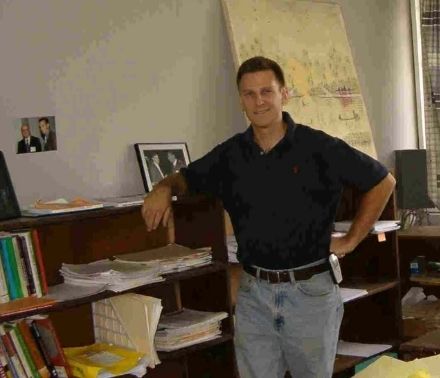
While pursuing his PhD in political science, Professor Carl LeVan won a Fulbright grant to conduct research at the University of Ibadan in Nigeria. From 2003 to 2004, LeVan collected data on different coalitions of Nigerian political actors and the leverage they bring to bear on policy change. He also looked at how different communities of ethnic groups try to advance their preferences for the policy outcomes they want.
“What made Nigeria such an important case for exploring this was that it’s a country with a tremendous amount of ethnic diversity, a lot of oil, and a history of military regimes,” says LeVan. “I was there at a really exciting time because the country had only recently transitioned from a military government, so there was still a great deal of optimism and hope.”
During his Fulbright, LeVan built a community of friends and colleagues from whom he learned about the country and its culture. He still keeps in touch with that community, not only visiting who he met through the experience, but also working on projects together. Two years ago, he published the co-edited volume The Oxford Handbook of Nigerian Politics, which featured numerous contributors he met through his Fulbright.
“For SIS students who want to become Fulbrighters, the application needs to reflect that you have an understanding of what to expect when you get to your country and also your ability to deal with uncertainty,” says LeVan. “I don’t hesitate to remind Fulbright applicants who want to go to a place like Nigeria that I went a week without running water. There are paragraphs of my dissertation that I wrote with my laptop connected to a car battery. These sound like difficulties or frustrations, but they get built into the rhythm of life in different places, and you take those lessons home with you. I’m grateful that I’ve had those experiences and that they’ve helped shape who I am.”
Maren Lujan, SIS/MA ‘17
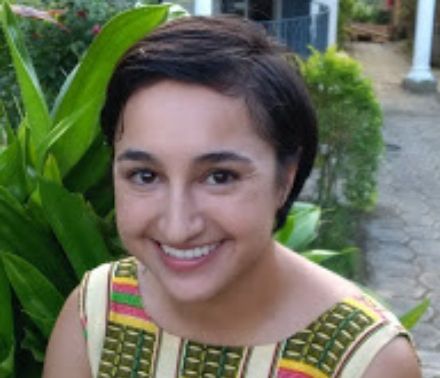
After completing her master’s degree in Development Management at SIS, Maren Lujan traveled to Sierra Leone to complete an anthropological research grant. She was not very familiar with Fulbright before applying but learned about the opportunity through an email sent to SIS students about research and grant opportunities.
Lujan encourages interested students to get started on their applications early. She was disappointed when she was originally selected as an alternate but was encouraged by her professors to stay hopeful: “Even if someone is selected as an alternate, I encourage them to stay hopeful. I have met so many different Fulbrighters who have applied multiple times, so even if you don’t get selected after one application, you should continue to reapply.”
In 2018, Lujan completed ethnographic research in a rural town in northern Sierra Leone, investigating the social and cultural determinants of women’s health in the area. She had a background in social research, previously working as a research assistant for several SIS professors and nonprofits: “The Fulbright was a culmination of my education and previous experiences. It was very rewarding to feel like other people recognized my potential in this field.”
Lujan would like to continue working in the medical anthropology field and is considering pursing a doctorate degree in the future. She now uses the experience she gained from her Fulbright in Sierra Leone in her current profession, serving as a community health planner for the City of Austin, Texas.
“One of the practices I was trying to implement during my Fulbright was community participatory practices,” says Lujan. “I currently work for a local health department, and that’s what we’re trying to achieve here, working with community stakeholders, our community partners, and our residents. We are engaging with them to learn about what their health needs are and are working collectively to address those needs.”
Naomi Moland, Faculty
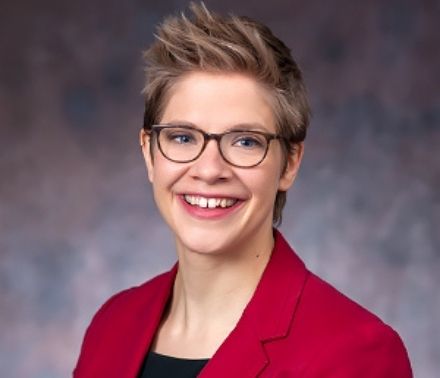
After finishing her BA, Professor Naomi Moland spent five years working as an elementary school teacher in Phoenix, Arizona, as part of Teach for America. She worked predominantly with Mexican immigrant students and was inspired to apply for a Fulbright to learn how other countries work with migrant populations in schools. She won a grant in 2006 to teach English part-time at a school in Madrid with immigrant students.
“It was an experience that really sparked and continued my interest in international and multicultural education—how states use schools as ways to socialize and integrate immigrants into their population,” says Moland.
Alongside teaching, Moland also conducted research during her Fulbright. She interviewed students and their parents about their migration and adaptation experiences in Madrid. She was able to get to know the families and the teachers with whom she worked and to learn more about the Spanish school system.
“It was such a valuable experience to get into the day-to-day of what it’s like to be a teacher in Spain and to meet people in a way that you never can when you’re a tourist or in an isolated work environment,” says Moland. “It was really valuable for me to venture into a Spanish institution and learn about things from the perspective of ordinary Spaniards that way.”
Moland believes it’s important for SIS students interested in the Fulbright program to be open to learning from and understanding different perspectives from people in other countries: “That’s the core of what Fulbright wants. People who believe in citizen diplomacy—person-to-person diplomacy—in which relationships are formed. It’s a much larger kind of diplomacy that’s based on relationships and people being able to see things from a different perspective and understand where different people are coming from.”
Ammarah Rehman, SIS/BA ‘19
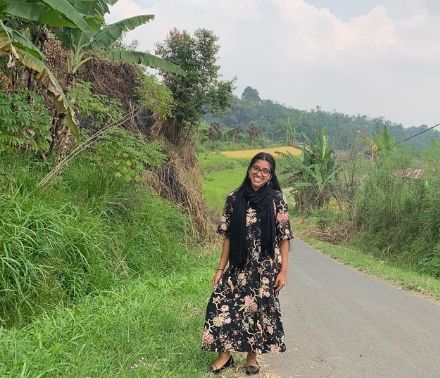
Ammarah Rehman’s Fulbright experience in Indonesia was both eye-opening and impactful. She taught English to high-schoolers at an Islamic school in the town of Bukitingi, where she lived in a house on campus. During her year there, Rehman worked with the English department to convert one of the rooms in her living area into a library in which students could gather after school. She spent a lot of time getting to know her students as well as sharing what life in the US is like.
“I’ve never heard the call to prayer in Boston. In Bukitingi, the call to prayer was played five times a day,” says Rehman. “I would ask my students how many mosques are in this town, and they would say, ‘I’m not sure Miss—hundreds.’ I would tell them how there are only one or two mosques in all of Boston, and they were so surprised by that,” says Rehman, who is Muslim herself.
Rehman prioritized making sure her students weren’t exposed to a white-washed portrayal of the United States. For example, most people mentioned in the students’ reading comprehension texts were white, so she would rewrite the texts to showcase the US’s diversity. She also shared with her students parts of US history of which they weren’t aware, such as segregation.
“Where I was in Indonesia, there was this perception that racism didn’t exist in the US and that the country was a model example of what society should be,” says Rehman. “When I told them about segregation and showed them pictures of ‘White Only’ signs, they were really shocked. During every single lesson, I would always try to bring in a diverse perspective.”
Rehman still has a passion for teaching. She currently works on instructional design and curriculum-building at the Aspen Institute’s College Excellence Program and teaches English as a second language (ESL) at a community center after work to recent US immigrants: “I never thought teaching would give you so many skills or open up so many doors—there’s so much you can do in the education space. I would always recommend doing a Fulbright because it opens up a lot of perspectives and opportunities for one professionally.”
Jesse Ribot, Faculty
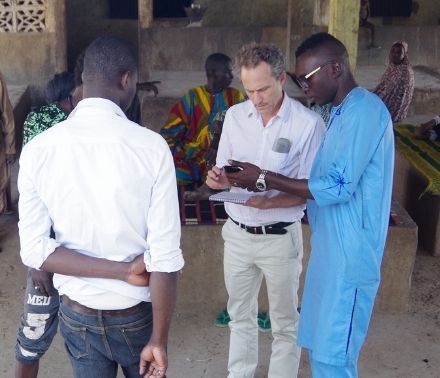
In 1986, Professor Jesse Ribot conducted his Fulbright research on the social structure of rural-urban forestry markets in Tambacounda, Senegal, hoping to show the mechanisms through which urban demand had effects on the rural environment—specifically deforestation. At the time he was applying for the Fulbright, Ribot was finishing up his master’s degree and wanted desperately to do field research.
“Fulbright was an amazingly open grant. It didn’t come with restrictions. It didn’t come with reporting hassles. It didn’t come with any idea that you would or would not do what you set out to do,” says Ribot. “The Fulbright Commission judges the proposal to be worthy, and then they trust you to run with it—you do what you need and want to accomplish.”
Ribot’s Fulbright research revealed that distribution and intensity of environmental effects were mediated by the social and political structure of markets—not by mere supply and demand. The deforestation turned out to be more of a social-justice than an environmental issue—the forests regrew while forest villagers were left destitute with little income from local forest goods. He ended up writing his doctoral dissertation on this research and has since focused his career on environmental justice and rural wellbeing in natural resource-dependent communities.
“Doing fieldwork in another world—another culture—is going to transform who you are in very deep ways, and you will come back as a different person,” says Ribot. “Going to Senegal had a big effect on my life, and Fulbright facilitated that.”
Sally Shelton-Colby, Faculty
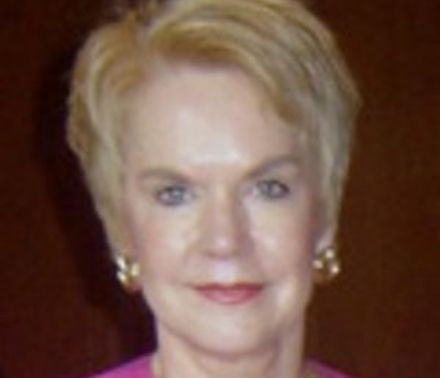
For her Fulbright grant to conduct research at l’Institut des Sciences Politiques in France—which took place in 1969—Ambassador Sally Shelton-Colby explored how the French and the North Vietnamese were able to build a new relationship after France was defeated in the Indochina wars. She was interested in how countries who were once enemies could develop friendly relations.
“The normalization of relations happened in a very short period of time—from 1954 to 1975—basically a generation. I was looking through declassified archives, and it was a fascinating experience,” says Shelton-Colby.
Shelton-Colby looks back fondly on her time in Paris, especially the opportunities she had to understand different perspectives, as this was a crucial aspect to her career as a diplomat: “If you want to be a diplomat, whether in the corporate world, the government, international organizations, or in life, you need to understand how others think. And there’s nothing better that can help you understand how the other guy thinks except living abroad.”
She emphasizes that students who are interested in programs like Fulbright keep their minds open to learning about different subjects, regions, and issues: “You never know when you’re going to stumble onto a new issue that you’d never thought very much about that ends up becoming your passion.”
Matthew Taylor, Faculty
Professor Matthew Taylor completed two doctoral dissertation fellowships through Fulbright, conducting research in São Paulo and Brasília, Brazil, in 2003 and 2004. He did his dissertation research on economic policy in Brazil and the challenges the country faced in trying to reform its economy.
At the time, academia and the media were focused on Brazil’s legislative roadblocks to economic reform, but Taylor found that the legislature was not the problem; in many cases, economic reform was moving forward in the legislature and then hitting a roadblock in the courts. Taylor developed an interest in the relationship between courts and public policy and found through his research that this took place not just for economic policies but across a range of public policies that had an effect on development possibilities in Brazil.
“Courts oftentimes have a rule that was underappreciated in Latin America, particularly because, at this point, many democracies in Latin America were only a couple of decades old,” says Taylor. “The courts were seen as either subservient to or dependent on the executive branch, but they were playing a much bigger role than many people gave them credit for.”
The Fulbright program allowed Taylor to finish his doctorate, set off his career studying Brazil and Latin America, and led to his first book, which was adapted from his dissertation research. His advice for anyone interested in pursuing a Fulbright is to not be intimidated by the prestige of the program: “I would say, ‘Go for it.’ Fulbright is always looking for qualified candidates, and oftentimes, we tend to censor ourselves and not apply when we really should. There’s nothing lost in filling out an application and taking a shot.”


